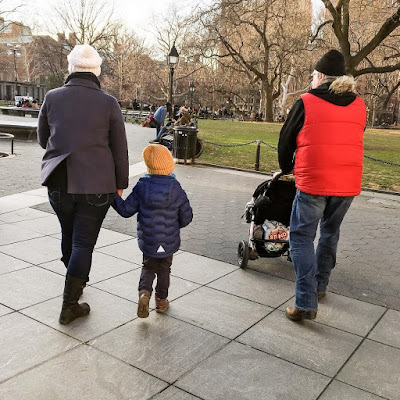There is SO much more to say about the creative reality of social media. But in the last three days alone, I have:
+ Read poetry that moved and strengthened my heart
+ Received photographs of my newly born grand-niece
+ Prayed over obituaries and eulogies saturated in gratitude
+ Reconnected with a student from Cleveland who practiced music in the church basement 30 years ago
+ Wept with sisters and brothers in the United Methodist Church
+ Laughed over a meme concerning bass players
+ Reflected theologically upon my own journey into aging
+ Welcomed the wise counsel from a dear friend about his own journey into hearing loss
+ Posted pictures of our most recent snow fall
+ Explored weather forecasts for a gig this weekend as well as my next trip to L'Arche Ottawa
+ And followed the major events of the day including: the testimony of Michael Cohen, the collapse of the North Korean Summit, Theresa May's Brexit problems, the ups and downs of the Oscars, the intricacies of the India/Pakistan/Kashmir tensions, etc.
Before I went to sleep last night I had to return thanks to all that is holy for the multiple blessings that came into my small life over these three days. And while I would have encountered some if there was no social media, some would never have come to pass. Take the music student from 30 years ago in Cleveland. She found me through Linked-In and remembered the memorial service I led for a beloved music teacher. She recalled playing in the Cleveland All City Youth Orchestra that rehearsed in the basement of Trinity United Church of Christ on West 25th Street while I was pastor. As we shared messages, she made a point to note: "You helped us grieve the death of Mr. Wooten, black and white, each with our very own but different ways of grieving. You made sure that we all felt welcomed."
In a week when the hierarchy of the United Methodist Church chose to push out their LGBTQ sisters and brothers, her words hit me hard. What a precious gift: To be remembered for an act of tenderness 30+ years later? Wow! Whatever else you might think about using social media, its relative ease can empower us to stay connected, share love and strengthen what is good, pure, noble, true and just. In a week where I was also mostly homebound because of illness, it was a treat to be able to check in with family and friends from all around the world. And how about this:"Poem for Mt Former Niece" by Amie Whittemore? Another gift for sure!
to remember your hair
in my hands, softest foxtails.
Or your voice as you kicked
your feet in the bath.
Your five-year-old insights, zinnia-bright.
Being your aunt is winning
summer, warm rain, and
a tap-dancing unicorn.
It's chocolate cake for breakfast
and a tea party with panda bears––
please, draw that for me.
That's what I would have asked
before the divorce. Now,
in this new land, I treat you
like a unicorn. Sugar cubes
in my hand, soft whistle
in my throat.
There's no word
for "former niece."
I'd rather eat
500 pickles than invent
such a term.
I hope you laugh
about those pickles.
Rare egg, trust your shine.
Know I tend a bouquet for you.
A prayer from Prayers for a Domestic Church written by Fr. Ed Hays puts it like this:
...as Your Son, Jesus, found Your Sacred Presence not only in the Temple, but also within the temple of the cosmos, may I find You in everything and everyone I meet today. Jesus, my savior and teacher, sought you, O God, in mountain heights and desert wastes, in the faces of his neighbors and in the laughter of his companions. May I who seek to walk in his footsteps do the same this day.
Without returning thanks for the blessings I experienced this week from social media today, this prayer would leave a bad taste in my mouth.






























